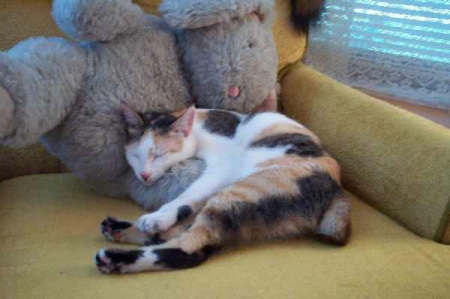
Every storyteller starts somewhere, and I started with My Little Ponies. My earliest characters, plots, and themes were hammered out in elaborate games with these delightful Hasbro toys, which debuted in 1981. My Little Pony launched officially in 1983, when I was 6 years old, and my best friend and I got on board immediately. Our parents couldn’t afford to buy us all the Ponies we craved, so we contented ourselves with cutting out the pictures from the backs of the Pony boxes and playing with these as though they were additional plastic toys. In this way, just two or three Ponies became a herd. Some Ponies acquired personalities and even reputations before they were ever made “flesh”…er…plastic…in our collections.
There was a TV show, even back then, but I don’t remember much about it. I invented personalities for most of the Ponies, which endured across the various games and scenarios we created for them.
My first Pony was Cherries Jubilee, but she never suggested a really strong personality to me. The first one that truly caught my imagination was Baby Firefly. I remember the exact moment when I opened her box. I was 8. By some extraordinary stroke of good fortune, I got both Baby Firefly and Baby Surprise at the same. I almost never got two Ponies at once outside of Christmas. I think they were on sale.
I looked at Firefly with her lightning bolt and unruly blue hair, and then at Surprise with her snow white coat and sweet, little balloon, and I knew at once that these two had to be rivals. Surprise was clearly the good one, and Firefly was clearly the naughty one.
And Firefly was clearly more interesting.
In that moment, Firefly became my first well-defined trickster. She was not strong, nor particularly brave, but she was exceedingly clever, full of mischief, occasionally cruel, and always a smart-ass. She was a trickster in the grand old tradition going all the way back to Loki and Coyote and forward to El-ahrairah, Ferris Bueller, and Jack Sparrow. In their purest, archetypical forms, these characters are amoral agents of chaos. However, when given a true personality, they generally have understandable goals, loves, fears, and desires. They just accomplish their goals by wit and guile, rather than force or argument.
This kind of character appears again and again in my fiction. Storm from Hunters Unlucky, Fenrah and Sham (with Sham playing the role of the smart-ass) from Prophet, Sirapous from Walk Upon High (this book has not yet been released). Silveo from Cowry Catchers is certainly the most complex trickster I’ve written to date and probably the most true-to-form.
Of course, I didn’t know any of that when I picked up Firefly. I was 8.
Over the course of the next four years, I acquired a technicolor herd of plastic Ponies. There were Sea Ponies, and So-soft Ponies, Flutter Ponies, Big Brother Ponies, Ponies with carousel designs, Ponies with butterfly wings, Ponies with shaggy feet, and Ponies with absurdly long, tinsel mains.
I rarely played with these toys alone. What would be the point of telling a story with no audience? My most frequent companion was my little brother (who is still often my First Reader). My Ponies sometimes went to war with his Transformers. There were assassins and ninjas involved. On one memorable occasion, the transformers laid siege outside the closet, while my friend and I carried on life inside the castle (closet). We got so involved that we completely forgot about the siege and my poor brother, waiting patiently outside for the war to begin.
In addition to Transformers, my Ponies had frequent dealings with plastic dinosaurs, Hot Wheels, Micro Machines, stuffed animals, and various miniatures (but no dolls…because I disliked dolls). Is it any wonder there are so many species in my stories? About the time I stopped playing with toys, I started giving my brother stories to read. One day, the Ponies were put away for the last time.

Image by pullip_junk, Creative Commons License
Years later, I came home from college and heard about this amazing new thing called eBay. I discovered that people were selling Ponies online for a lot more than I had ever paid for one. So I cracked open the big box of Ponies and started going through it. I knew all their names, so I could list them correctly, allowing collectors to find them. I spent an enjoyable few summers curling their hair and taking pictures of them before shipping them off to new owners.
I sold maybe two-thirds of my collection. I also bought a few other people’s collections, dolled them up, took attractive photos, and sold those.
I didn’t sell them all, though. I couldn’t ever sell Firefly. That would be like selling my childhood. And there were others. Baby North Star, Baby Pockets and her Kangaroo, Kingsley the Lion… Most of the ones that I couldn’t part with were the tricksters—the ones who had such strong personalities that, even a decade later, I remembered them vividly. I still have a box of Ponies in my closet—some of them damaged from too much play, some too cute or unusual to sell, and some who were tricksters—the prototypes of my later characters.
Recently, I was babysitting a friend’s 8 year-old-daughter for an afternoon. She read for a while on my Kindle and then grew restless. I asked if there was anything she’d like to watch on Netflix. She said, almost sheepishly, “Have you ever heard of My Little Ponies?”
“Yeah, kid, I might have heard of them.”
We proceeded to have My Little Pony viewing marathon. The Generation-4’s look a little different from the Generatoin-1 Ponies that I grew up with, but they’re still a candy-colored Hasbro product. I’m glad to know that kids still get to fall in love with My Little Ponies, tell stories with them, and maybe even create a few tricksters.

